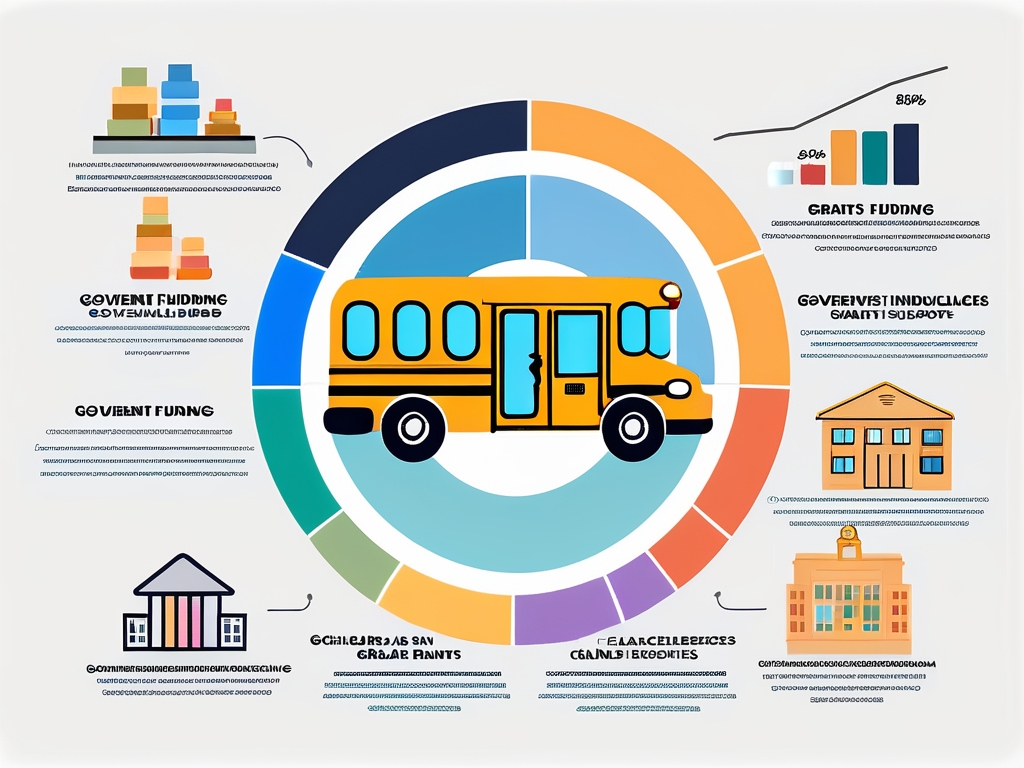In the fast-paced and ever-growing childcare industry, effective financial management is essential for success. Childcare centers face unique financial challenges that require careful budgeting and strategic planning. This article will delve into the importance of financial management in childcare, explore the key components of a childcare budget, discuss strategies for effective financial management, highlight government funding and grants available to childcare centers, and provide insights into long-term financial planning for childcare owners.
Understanding the Importance of Financial Management in Childcare
Financial management plays a crucial role in the smooth operation and sustainability of childcare centers. A well-managed budget ensures that funds are allocated appropriately, resources are maximized, and financial goals are achieved. Sound financial management allows childcare centers to operate efficiently, provide high-quality care, and maintain a competitive edge.

Moreover, effective financial management in childcare centers involves not only budgeting and resource allocation but also strategic financial decision-making. This includes analyzing revenue streams, managing cash flow, and implementing cost-saving measures to enhance overall financial health. By monitoring financial performance metrics and adapting to changing economic conditions, childcare centers can navigate challenges and seize opportunities for growth.
The Role of Budgeting in Successful Childcare Operations
A comprehensive budget serves as a roadmap for childcare centers by outlining income and expenses. It enables owners and managers to make informed decisions, prioritize expenditures, and allocate resources effectively. A well-crafted budget provides the foundation for financial stability and allows for effective long-term planning.
Furthermore, budgeting in childcare centers extends beyond day-to-day expenses to encompass investment in staff training, facility improvements, and educational programs. By aligning budget priorities with the center’s mission and goals, childcare providers can enhance the quality of services offered and create a nurturing environment for children to thrive.
Key Financial Challenges in the Childcare Industry
The childcare industry faces several unique financial challenges, making effective financial management even more critical. Rising staffing costs, facility expenses, and the need for educational materials and supplies pose significant financial strains. With an understanding of these challenges, childcare centers can proactively address them through proper budgeting and financial planning.
Moreover, regulatory requirements, fluctuating enrollment numbers, and competition from other childcare providers add complexity to the financial landscape of childcare businesses. By staying abreast of industry trends, leveraging technology for financial tracking and reporting, and fostering strategic partnerships, childcare centers can navigate these challenges and ensure long-term financial sustainability.
Schedule a free 30-minutes session with us
Essential Components of a Childcare Budget
Creating a comprehensive childcare budget requires careful consideration of various components. Let’s explore some of the key elements that should be included in every childcare center’s budget.

Establishing a well-rounded childcare budget involves more than just listing expenses and income. It requires a deep understanding of the unique needs of the children in your care, the expectations of parents, and the regulatory requirements that govern childcare operations. By taking a holistic approach to budgeting, childcare providers can ensure that every dollar is allocated effectively to support the well-being and development of the children they serve.
Staffing Costs: The Biggest Expense
Personnel costs typically account for the most significant portion of a childcare center’s budget. Staff wages, benefits, and ongoing professional development should be carefully budgeted to ensure an appropriate and sustainable allocation of resources.
Investing in well-trained and qualified staff is essential for providing high-quality care and education to children. Budgeting for competitive wages and benefits not only helps attract and retain talented educators but also demonstrates a commitment to valuing the important work they do in shaping young minds.
Facility Expenses: Rent, Utilities, and Maintenance
Childcare centers must allocate funds for facility-related expenses such as rent, utilities, and maintenance. These costs should be factored into the budget to ensure the center’s physical infrastructure remains safe, comfortable, and conducive to children’s learning and development.
Regular maintenance and upgrades to the facility are crucial for creating a welcoming and stimulating environment for children. Setting aside funds for routine repairs, renovations, and safety improvements not only ensures compliance with licensing regulations but also enhances the overall quality of the childcare experience for both children and their families.
Educational Materials and Supplies: A Necessary Investment
Childcare centers rely on a wide range of educational materials and supplies to create enriched learning environments for children. Allocating funds for these investments in the budget ensures that the center can provide the necessary resources to support children’s growth and development.
From books and art supplies to educational toys and technology tools, the materials used in a childcare setting play a crucial role in engaging children and promoting their cognitive, social, and emotional development. By budgeting for high-quality, age-appropriate materials, childcare providers can create dynamic learning spaces that inspire curiosity, creativity, and a love for learning in young children.
Strategies for Effective Financial Management
Effective financial management goes beyond creating a budget. It involves ongoing monitoring, review, and adjustments. Let’s explore some strategies that childcare centers can implement to ensure efficient and sustainable financial management.
Financial management in childcare centers is a multifaceted task that requires attention to detail and proactive planning. Beyond the day-to-day operations, strategic financial decisions play a crucial role in ensuring the long-term success and sustainability of the center. By implementing robust financial strategies, childcare centers can not only thrive but also provide high-quality care and education to children.
Regular Financial Reviews and Adjustments
Regularly reviewing financial performance against budgeted figures allows childcare centers to track their financial health. By identifying discrepancies, trends, and potential issues, adjustments can be made promptly to ensure the center remains on track to meet its financial goals.
These reviews also provide an opportunity to assess the effectiveness of existing financial strategies and explore new avenues for growth and cost-saving. By analyzing financial data regularly, childcare centers can make informed decisions that drive efficiency and maximize resources.
The Role of Technology in Streamlining Financial Processes
Embracing technology and using dedicated software can streamline financial processes, reduce administrative burden, and improve accuracy. Automated payroll systems, expense tracking software, and financial reporting tools provide childcare centers with real-time insights and eliminate manual errors.
Furthermore, technology enables childcare centers to centralize their financial data, making it easier to generate reports, track expenses, and monitor cash flow. By leveraging technology, childcare centers can operate more efficiently and allocate resources effectively to support their core mission of providing a nurturing environment for children.
The Importance of a Contingency Fund
Setting aside funds for unexpected expenses or emergencies is fundamental to prudent financial management. A contingency fund provides a safety net and helps childcare centers navigate unforeseen challenges without compromising the quality of care or jeopardizing long-term financial stability.
In addition to unexpected expenses, a contingency fund can also be instrumental in seizing opportunities for growth or expansion. By having a financial buffer in place, childcare centers can weather uncertainties and position themselves for long-term success in a competitive market.
Schedule a free 30-minutes session with us
Government Funding and Grants for Childcare
Government funding and grants can provide significant financial support to childcare centers. Understanding the available subsidies and resources can help maximize financial opportunities for sustainability and growth.

Childcare centers play a crucial role in supporting working parents by providing a safe and nurturing environment for their children. Government funding aims to ensure that these centers can maintain high-quality standards, offer affordable services, and contribute to the overall well-being of families and communities.
Understanding Government Subsidies for Childcare
Governments offer various subsidies and financial assistance programs to help parents afford quality childcare services. Childcare centers should familiarize themselves with these subsidies and develop strategies to maximize their utilization.
In addition to direct financial support, government subsidies often come with guidelines and regulations that childcare centers must adhere to. These guidelines may focus on staff-to-child ratios, educational curriculum standards, health and safety protocols, and more. By understanding and complying with these requirements, childcare centers can not only access funding but also ensure the best possible care for the children under their supervision.
Applying for Grants: A Potential Source of Additional Funding
Grants are a valuable source of additional funding for childcare centers. Researching available grants, understanding eligibility criteria, and submitting compelling applications can result in financial support for specific projects, program enhancements, or facility improvements.
Grants can also provide opportunities for innovation and growth within childcare centers. Whether it’s investing in new educational resources, upgrading play areas, or implementing sustainability initiatives, grants can empower childcare providers to expand their services and create more enriching experiences for the children in their care.
Long-Term Financial Planning for Childcare Centers
Building a financially sustainable childcare center requires long-term planning, foresight, and proactive decision-making. Let’s explore some crucial considerations for long-term financial planning in the childcare industry.
Planning for Expansion and Growth
As childcare centers grow and expand, careful financial planning becomes increasingly important. Anticipating funding needs, conducting feasibility studies, and developing realistic financial projections are essential components of managing growth effectively.
Preparing for Unexpected Financial Challenges
Childcare centers must prepare for potential financial downturns or unforeseen challenges. Creating a reserve fund, exploring insurance options, and having contingency plans in place can mitigate the impact of unexpected financial events.
Retirement and Succession Planning for Childcare Owners
Planning for retirement and ensuring a smooth succession process are critical for childcare owners. Financial planning should encompass not only the center’s sustainability but also the long-term financial well-being of the owner(s).
In conclusion, financial management is a fundamental aspect of running a successful childcare center. Through strategic budgeting, effective financial management, and understanding government funding opportunities, childcare centers can thrive in a challenging industry. By implementing sound financial strategies and engaging in long-term planning, childcare owners can achieve financial stability while providing high-quality care to the children they serve.
